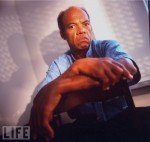Just In Case, Keep Fingers Crossed for 'Sex and the City 3D'
Okay so it’s not impossible that there might be a Sex and the City 3. Is 3D too much to ask ?
Having Google Doodle Next Best Thing To Not Being Dead

Um, this seems like setting the tribute bar a little low: “If John Lennon had still been alive, he would be turning 70 on Saturday — but he has received the ultimate tribute in the shape of a Google Doodle.”
Who Are The Climate Change Skeptics?
Meet the climate change skeptics: “A handful of US scientists have made names for themselves by casting doubt on global warming research. In the past, the same people have also downplayed the dangers of passive smoking, acid rain and the ozone hole. In all cases, the tactics are the same: Spread doubt and claim it’s too soon to take action.”
John Edgar Wideman On The Sadness Of Emptiness

Soon after moving to New York in 1995, I was walking down Avenue A one afternoon when a guy with a frown on his face beckoned me over to him. He was a black guy, standing next to a suitcase he’d placed on the curb. “Excuse me,” he said. “But could you hail me a cab?”
I looked out on onto the street, where there were many cabs with their vacancy signs lit up driving past us. I looked back at him puzzled.
“None of them will stop for me.”
I looked at him like was pulling my leg. Because I thought maybe he was.
“Because I’m black,” he said, exasperated, with an unspoken “Duh!”
“Really?” I said. I stepped out into the street and raised my arm. A cab pulled over almost immediately.
“Thanks,” he said, politely. But he was angry. “I’ve been out here ten minutes. I gotta get to the airport.”
“Sure,” I said, stunned. I had heard about this phenomenon on TV and stuff. But I guess I’d never understood it to be so blatantly true. There were really lots of cabs on the street. I stepped aside so he could get to the one that had pulled over. “And, umm,” I stammered some and offered a lame, “Sorry.”
He gave me an expression somewhere in between “Thanks, you’re sweet,” and “You’re an idiot.”
For the next five years, I worked at Vibe magazine with lots of black people, and it became a very regular and accepted thing-whenever a bunch of us would leave the office and to go anywhere together, I would get the cab. We joked about it, Like, What a world. But the joke was always a little sour.
If you missed John Edgar Wideman’s op-ed in yesterday’s Times, about how no one ever takes the empty seat next to him on the train because he’s black, you should read it. It’s really good.
“I admit I look forward to the moment when other passengers, searching for a good seat, or any seat at all on the busiest days, stop anxiously prowling the quiet-car aisle, the moment when they have all settled elsewhere, including the ones who willfully blinded themselves to the open seat beside me or were unconvinced of its availability when they passed by. I savor that precise moment when the train sighs and begins to glide away from Penn or Providence Station, and I’m able to say to myself, with relative assurance, that the vacant place beside me is free, free at last, or at least free until the next station. I can relax, prop open my briefcase or rest papers, snacks or my arm in the unoccupied seat. But the very pleasing moment of anticipation casts a shadow, because I can’t accept the bounty of an extra seat without remembering why it’s empty, without wondering if its emptiness isn’t something quite sad. And quite dangerous, also, if left unexamined.”
Wideman’s novel Philadelphia Fire is really good about this stuff, too. It’s based around the 1985 police bombing of the Move headquarters and is more broadly about blackness and anger and sadness and fucked-upness in America. But it also has the funniest, most-profane rereading of the Tempest you’ll likely find anywhere. And Wideman’s prose is beautiful beautiful. You should pick it up, if you haven’t already read it.
The Best Women Writers That You've Maybe Never Read: Sybille Bedford


How would you like your first novel to have been reviewed by Evelyn Waugh in the following terms? “A book of entirely delicious quality… everything is new, cool, witty, elegant… we gratefully salute a new artist.”
Janet Flanner (“Genêt” of the New Yorker) had this to say: “An astonishing and fascinating first novel.”
And Nancy Mitford said, “I think it one of the very best novels I have ever read.”
From such commentary (and from the magnificos who stepped up for this dustjacket love-fest for the first U.S. edition) you might easily surmise that Sybille Bedford’s A Legacy is somewhat snobbish in tone, and you’d be so right. Even this defect, however, which normally sends me screaming into the streets, will likely fail to faze the reader of that superb novel, first published in London in 1956.
As a prose stylist, Bedford was like a god walking this earth. She could be as thrilling as Robert Harris, and as observant and witty as Lampedusa. Everything the august trio above had to say is true, and to their praise I will add that A Legacy is very touching, and acidly funny and also funny in an entirely original way. Perhaps much of the special flavor of Bedford is owing to her having spent her earliest years in Germany with the impoverished nobleman who was her father, one Maximilian von Schoenebeck, and so her style has a different grain and texture from the Anglo stuff one is accustomed to; she spoke mainly German until her father died, when she was ten:
After her father’s death, she moved with her mother to the French Riviera-as yet unsubmerged by money and fashion-and began wondering if she should write in English or French. “I’m so glad I chose English. You can play about with English.”
In her adopted England, Bedford was even more celebrated for her reporting on the law than she was for her novels and memoirs, if that were possible. She covered the Chatterley trial, the trial of the former staff at Auschwitz and the trial of former Liberal leader Jeremy Thorpe, accused of conspiracy to murder. Bedford held hands in a taxi with Dr. Stephen Ward, the osteopath who was a victim of trumped-up charges at the center of the Profumo mess, only a few hours before that unfortunate man committed suicide. She even covered the trial of Jack Ruby for Life Magazine-she’d spent the war years in the U.S., having had to flee Italy because her mother was part Jewish. In this she was helped by Aldous Huxley and his wife, Maria, who allegedly opined, “We need to get one of our bugger friends” for passport purposes.
And so:
Sybille entered a marriage of convenience with an English Army officer, Walter “Terry” Bedford (an ex-boyfriend of a former man-servant of W.H Auden’s) […] and obtained a British passport. The marriage ended shortly thereafter, but Sybille took her husband’s surname, publishing all of her later work as Sybille Bedford. [via Wikipedia, via Victoria Glendinning in Sybille Bedford: In Memory]
Bedford was a devoted oenophile whose writings on food and drink are models of that genre as well. Reading just those, it would be easy to let the idea that she was a heedless sybarite get away with you. She was a great sensualist in all ways, widely traveled, with many lovers and a zillion friends; a great bonne vivante. Once in a while you see people complaining that she lays on too much food in her novels, even:
In some of her books wine and food feature so often that even the admiring critic Francis Wyndham confessed that he had begun to dread the arrival of another meal.
There’s such a wonderful tension between the hedonist and the historian in this author. My favorite of her books might be Faces of Justice, a comparison of the judicial systems of England, Germany, Switzerland, Austria and France, just because it is such an odd book. Bedford had a lifetime addiction to courtrooms, and she reported on their proceedings with the penetration, the discernment and the slight loopiness she brought to all her writing.
There used to be two features of the London courts which were unique; nothing like them could be seen anywhere else in the entire world; they were the prostitutes and the motorists. […]
“Mary Cheam-” A tall girl, not very young, in a sober tailormade and well-done hair. One would have taken her for a saleswoman in a good London shop.
“Here frequently?”
“She is, sir.”
“You admit that?”
“Oh, many times.”
“Forty shillings.”
[…] A red-wristed housewife in a shapeless cardigan, “She’s been here twice last week, sir.” … A slim girl in stove-pipe slacks … A tart who looks like a tart … A neat lady from Japan, “Why didn’t she appear yesterday?” “She went to Marylebone by mistake, your Worship.” “Funny, many people seem to do that.”
The most terrible and moving part of Faces of Justice is to do with the Rückerstattungskammern, The Courts of Restitution. These courts were set up in Germany in order to deal with claims for possessions torn from the Jews between the years of 1933 and 1944.
A Turkey carpet driven off by the SS; a brooch and two gold rings confiscated in a precious-metals drive; a Bechstein grand; a wireless set… A boy’s motor bicycle…. A fur coat taken away by the Gestapo after a morning raid… Anyone who cares to may walk in and hear; this is the aftermath of what everybody knew, and here it is going on, in living memories. And it is as grim and pitiful and unbearable as it ever was.
All of her writing is as valuable, and as beautiful, as this.
She enjoyed a good cigar “two or three times a year.” She loved good food, fast cars, Italian wine. In the opening of The Quality of Travel, from 1961, she wrote: “You can trundle Italian wines around in your car, open them, fling in a handful of ice, drink them without a glass, with any food, in carefree quantities.” She lived to be nearly ninety-five years old.
* * *
“The Smartest Thing She Ever Said” is a Tumblr based digital storytelling art project featuring four teams of two-one artist and one story editor-between now and the end of the year. For three weeks each, the teams were asked to interpret the phrase, “The Smartest Thing She’s Ever Said.” The current team features photographer Laura Taylor and writer Tess Lynch with support from project curator Alexis Hyde. ArtSheSaid.com and its artists are entirely supported by Ann Taylor in collaboration with Flavorpill.
See the story unfold HERE.
Maria Bustillos is the author of Dorkismo: The Macho of the Dork and Act Like a Gentleman, Think Like a Woman.
Kristin Hersh's 'Rat Girl': "Wildly Funny," Says the 'Times'
Kristin Hersh’s Rat Girl gets an extremely appreciative review in the Times today. You can enjoy it too!
It's Tina Fey's Book, "Bossypants"!

Currently being pimped/celebrated at the Frankfurt Book Fair: it’s a terrifying poster for the Tina Fey book of funny essays for which Little, Brown may have paid millions. Aiee, the man arms!
Britons Do Sex To Each Other

Of all the disgusting phenomena in Knifecrime Island, perhaps the filthiest is a fetish so foul it beggars belief that an entire nation could be caught in its gruesome grip. And yet it does indeed exist. When British people aren’t busy slashing each other with broken glass you’ll find them, I am sorry to say, participating in the nauseating activity known as “dogging.”
The idea that anyone would want to watch British people contort their unwashed sausagey bodies together in the act of physical congress rightfully sickens those of us in the civilized world, but on Knifecrime Island they can’t get enough of it. These dull-eyed savages, open-mouthed and covered in stab wounds, gather together in parks and fields and actually seem to take some sort of revolting pleasure in observing their equally dim-witted and monstrous countrymen insert various disease-ridden appendages into similarly squalid orifices.
And now someone’s told the New York Times about the whole thing.
Sarah Lyall takes us to Surrey, where there’s a whole lot of doggin’ going on. Particularly in the village of Puttenham, “famous for its ancient church; its friendly pub, the Good Intent; and its proud inclusion in both the Domesday Book” and for being a prime location where the island’s troglodytic syphilitics come to see and be seen fucking each other. The details are extremely British.
A stroll through the field the other day unearthed no doggers (it was raining) but revealed much evidence of their existence. Debris — used condoms, things made of rubber, pages torn from pornographic magazines, snack wrappers, discarded tea cups — littered the area. The paths were dotted with black mats that people had conveniently left behind for the next time.
Is there nothing to be done? Sadly, no: “Public sex is a popular — and quasi-legal — activity in Britain, according to the authorities and to the large number of Web sites that promote it. (It is treated as a crime only if someone witnesses it, is offended and is willing to make a formal complaint.)” And unfortunately, the law has made it clear whose side it’s on.
Police have been ordered to stop anyone taking in part in illegal outdoor sex being abused or verbally taunted as it can cause them to suffer post traumatic stress.
An extraordinary new Hate Crime Guidance Manual has been handed to officers telling them to arrest anyone suspected of committing a hate crime against those engaged in ‘dogging’.
Although it notes that outdoor sex can have an ‘impact on the quality of life of people using these locations for leisure pursuits’ — for example dog walkers and tourists — the rights of those cottaging, cruising or dogging must be taken into account by officers.
This will surely only embolden doggers, who are already insistent on the continuation of their appalling habit. “We shall fuck on the beaches, we shall fuck on the landing grounds, we shall fuck in the fields and in the streets, we shall fuck in the hills; we shall never surrender,” said one, before running off to make a cell phone video of a man manually pleasuring a woman with a Galaxy Ripple chocolate bar in the back of a Ford Fiesta.
And so the dogging continues.
Marijuana Legalization Explained
The animated Taiwanese take on the prospects for pot legalization in California is pretty much a guaranteed post-it ends with a frigging bear pulling hits off a bong-but I also enjoy the attention to detail our friends at Next Media Animation put into the whole thing: Note the clock on the wall when the kids exit school. It’s that kind of meticulousness that has made these guys the leader in CGI versions of news stories.
